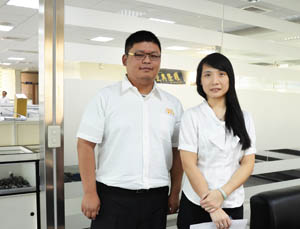
Industry Activities


“The whole Latin American market is filled with potential.” said Carol Tsai, Sales Manager of Jern Yao Enterprises. The company continues its business momentum of its predecessor and has gained a foothold in Brazil with continuous expansion to the neighboring countries. Currently, in addition to 20-30 clients in Brazil, the company has business presence in Argentina, Mexico, Peru and Chile.
Great Business Opportunities in Latin America
As a sales marketing specialist of Jern Yao, a manufacturer of screws, nut formers and special parts formers, Mike Huang analyzes that Brazil is the manufacturing hub of Latin America while Mexico is also on the rise due to its great location, which has been a major factor in luring the investors from the U.S. Moreover, Mexico is the biggest export destination in South America for Taiwan fastener products. It is expected that the local operators will make their own products in the future. ”For manufacturers of products, they’ve been there in Mexico for a while,” said Huang, “but for us, it’s a new market.”
Huang also mentioned Argentina with a belief in the huge demand of the market. “However, Argentina adopts a protectionism policy,” observed Huang, “If the policy changes, it will be a market we want to enter.” In the meantime, Jern Yao is trying to make exposure to the local buyers through trade show participation and magazine advertising.
Investment and Risk are Twins
The first task for entering a new market is to understand the local people’s traits and habits. As South America is different from the European and North American markets where Taiwanese manufacturers have been familiar with for a long time, Huang explained, “Because of the tax systems and habits, Brazilian clients would prefer a transaction on installments.” The payment method must be considered with mutual agreements and both sides need to have a well-established business operation.
In addition, the language is a big barrier for entering the South American market. All the countries except for the Portugese-speaking Brazil in the region are Spanish-speaking. Huang noted that not many local people spoke English. Therefore, Jern Yao usually dose business through the local agents. “We are looking for distributors who can talk to the clients face to face.” said Carol Tsai. She noted that Jern Yao is looking for distributors and welcomes cooperation on a case-by-case basis.
Tsai went on talking about her most unforgettable experience a few years ago when the Brazilian reals were diving and the clients delayed their payments or asked for lower prices. “We could only concede to the clients’ requests,” said Tsai, “considering their circumstances.” She also talked about the dangerous location of one of the clients’ factories where the public security is bad as the fight between the government and the drug thugs goes on. She could only go between the hotel and the factory and every trip to the factory is a frightening experience.
Deep Look Inside South American Internal Demand Shift Towards Special Machines
Major car manufacturers have set up operations in South America in recent years. The screws and nuts industry in Brazil is highly relevant to the auto industry. “The clients in South America used to buy screws and nuts formers which could not meet the precision requirements of auto parts production,” said Tsai, “therefore, the demand for special machines have increased.” She added that current standard parts are imported from China and southeast Asia and theirs costs are lower than those produced locally and this is why the clients are shifting to the special multi-function machines for production of parts with higher precision.
The South American market used to take up 10% of Jern Yao’s profit. However, the earning began to decline in 2012 mainly due to the recession of Brazil’s fastener industry as more and more companies directly imported cheap semi-finished products for assembly. Moreover, the cost of setting up factories in Brazil is very high. These have all contributed to the decrease of orders. Huang thinks that Taiwanese manufacturers must be prepared for this trend. According to the estimation of the local clients, it will take a while before the trade bloom brought about by the World Cup and the Olympic Games comes out.
Quality Being a Cure for Price Cutting
At last, Tsai gave a few suggestions to the operators who want to invest in South America: Be prepared for the habit of the Brazilian clients of paying on installments and beware of the slow economic trend of the country in the next two years; It’ not going to turn around very soon. Be patient with the language barrier and the cultural differences. With the South American economy picking up, the employee turnover rate has been very high, after-sale service and training are very important.
Jern Yao is making roads into the South American market with a focus on the “excellent distributors” and a goal to have distributorship in each country. In the face of the price war, the company’s answer is differentiation from the competitors. “We insist on quality and will never use cheap parts in order to lower prices,” said Tsai, “and this is our strength!”












